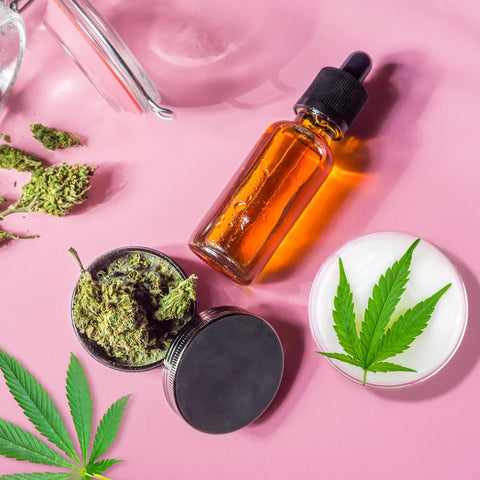Cannabidiol, or better known as CBD, is a compound extracted from the hemp plant that is gaining popularity in medicine. But what exactly does CBD do in the body? In this article we will look at the effects of CBD and explain the many benefits of this natural substance.
CBD is known for its anti-inflammatory, anti-anxiety, and pain-relieving properties. It interacts with our endocannabinoid system, affecting various processes in the body. But what are the uses for CBD and how can it help us to lead a healthier life? We will answer all these questions in this article.

H2: What is the effect of CBD?
CBD, also known as cannabidiol, is a natural compound found in hemp plants that has become increasingly popular in recent years. Many people use CBD to improve their health and alleviate various ailments. But what exactly does CBD do? In this article we will take a closer look at the different effects of CBD on the body.
H3: CBD reduces anxiety
CBD can help reduce anxiety and relieve stress. That's because it increases serotonin levels in the brain, leading to improved mood and relaxation. A study has shown that CBD can reduce anxiety in people with social anxiety disorder.
CBD can also help with other forms of anxiety, such as generalized anxiety disorder and post-traumatic stress disorder. However, it is important that CBD is not used as the sole treatment method and that one always consults a doctor before consuming CBD.
H3: CBD can relieve pain
CBD can also help relieve pain. It interacts with receptors in the brain and immune system to reduce inflammation and reduce pain perception. A study has shown that CBD can be effective for people with chronic pain, such as rheumatoid arthritis and multiple sclerosis.
CBD can also help with headaches and migraines. However, it is important to always consult a doctor before taking CBD to ensure there are no drug interactions.
H3: CBD can improve the skin
CBD can also help improve skin. It has anti-inflammatory and antioxidant properties that can help reduce acne and other skin problems. A study has shown that CBD can be effective for people with acne by reducing sebum production and reducing inflammation in the body.
CBD can also help with other skin conditions, like eczema and psoriasis. However, it is important to always consult a doctor before applying CBD to the skin.
H3: CBD can help with sleep problems
CBD can also help with sleep problems. It interacts with the receptors in the brain to improve sleep quality and reduce insomnia. A study has shown that CBD can help people with sleep disorders such as sleep apnea and restless legs syndrome.
CBD can also help with other sleep issues, such as insomnia and restless sleep. However, it is important to always consult a doctor before taking CBD to ensure there are no drug interactions.
H3: CBD can improve brain function
CBD can also help improve brain function. It interacts with receptors in the brain to improve communication between nerve cells and reduce inflammation in the brain. A study has shown that CBD can help improve brain function in people with Alzheimer's and Parkinson's.
CBD can also help with other neurological conditions, such as epilepsy and stroke. However, it is important to always consult a doctor before taking CBD to ensure there are no drug interactions.
H3: CBD has few side effects
CBD generally has few side effects and is safe to use. Most people tolerate CBD well and report no adverse effects. However, in some cases, it may cause fatigue, diarrhea, or changes in appetite.
However, it is important to always consult a doctor before taking CBD to ensure there are no drug interactions.
H3: CBD vs THC
CBD and THC are both components of hemp plants, but they have different effects on the body. THC is psychoactive and can cause a "high," while CBD is non-psychoactive and has no mind-altering effects.
CBD is often used to treat various ailments such as pain, anxiety and sleep problems, while THC is often used to treat nausea and vomiting in cancer patients.
It's important to always understand the differences between CBD and THC and the effects each of these cannabinoids has on the body.
H3: How to take CBD
There are several ways to take CBD. CBD oil is often dropped under the tongue and then swallowed, while CBD capsules are taken like regular pills. CBD creams can be applied to the skin to treat various skin conditions.
It is important to always use the correct dosage and application method and to follow the directions on the packaging.
H3: Fazit
CBD has many potential health benefits and can help with various ailments such as pain, anxiety and sleep problems. However, it is important to always consult a doctor before taking CBD to ensure there are no drug interactions.
CBD generally has few side effects and is safe to use. However, it is important to always understand the differences between CBD and THC and the effects each of these cannabinoids has on the body.
Overall, CBD is a promising addition to a healthy lifestyle and can help improve health and increase well-being.
frequently asked Questions
Here are some frequently asked questions and answers about CBD and its effects:
What is CBD?
CBD stands for cannabidiol, which is extracted from the hemp plant. It is one of many cannabinoids found in the plant. Unlike THC, CBD doesn't cause a psychoactive effect, meaning it doesn't get you high.
The effects of CBD are still being researched, but it is thought that it may help with pain relief, anti-inflammatory and relaxation.
How does CBD work?
The endocannabinoid system in the human body plays an important role in how CBD works. There are two types of cannabinoid receptors in the body, CB1 and CB2. CB1 receptors are mainly found in the brain and central nervous system, while CB2 receptors are mainly involved in immunomodulatory processes.
By interacting with these receptors, CBD can have a variety of effects in the body, from relieving pain and reducing inflammation to improving mood and sleep.
What are the health benefits of CBD?
There are many potential health benefits of CBD that are currently being studied. Some studies have shown that it can be effective in treating anxiety disorders, epilepsy, and chronic pain. There is also evidence that CBD can help treat sleep disorders and skin conditions like acne.
It's important to note that CBD does not offer a cure for these conditions and more research is needed to understand its long-term effects.
How is CBD consumed?
There are many ways to consume CBD, including oils, capsules, tinctures, and topical products like creams and lotions. It can also be inhaled in the form of vaporized CBD oil or flower.
The dosage of CBD depends on various factors, such as body weight, individual tolerance and the reason for taking it. It is important to follow label directions and consult a doctor if necessary.
Does CBD have side effects?
Although CBD is generally considered safe, it can cause side effects in some individuals. These can include tiredness, nausea, dizziness and changes in appetite. It's also possible for CBD to interact with certain medications, so it's important to discuss this with a doctor before taking it.
It's also important to note that CBD products aren't regulated, so it's important to buy products from trusted manufacturers and do some research on the origin and quality of the product.

In summary, according to numerous scientific studies, CBD can have a variety of positive effects on the human body. These range from relieving pain and inflammation to helping with anxiety and depression. CBD can also help to restore the natural sleep rhythm in the case of insomnia.
However, there is still a lot of research needed to better understand the exact mechanisms of action of CBD and to expand its possible uses. Nevertheless, in recent years CBD has become a popular natural remedy that more and more people are using to improve their health.
Overall, CBD is a promising alternative to traditional medication and offers numerous health benefits. It is therefore worth taking a closer look at this versatile natural substance and researching its effects.


